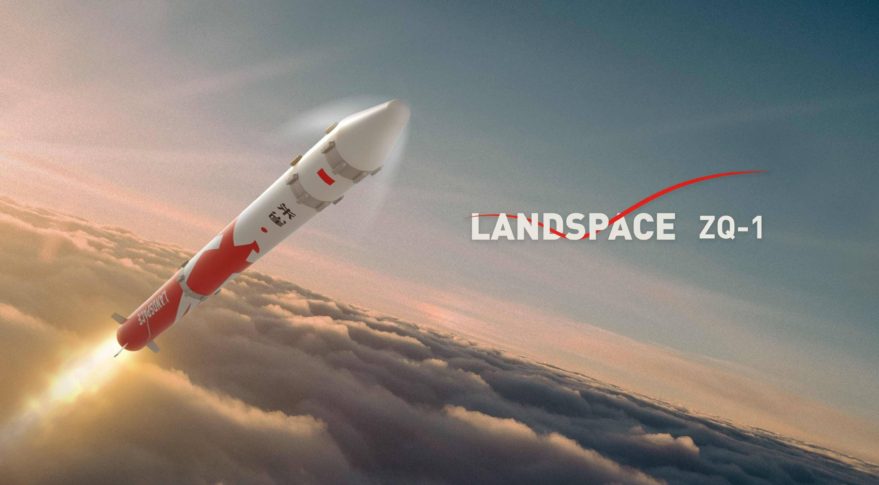China’s private space company fails on debut launch
October 30, 2018 | Expert Insights

The first-ever attempt by a private Chinese company to send a rocket into space has failed in an increasingly heated competition between commercial space start-ups.
This isn’t the first-ever launch from a Chinese commercial space company but was the first attempt to reach orbit.
Background
Private spaceflight is flight beyond the Kármán line (above the nominal edge of space at 100 km (62 mi) Earth altitude)—or the development of new spaceflight technology—that is conducted and paid for by an entity other than a government agency.
In the 2000s, entrepreneurs began designing—and by the 2010s, deploying—space systems competitive to the national-monopoly governmental systems of the early decades of the space age. These new offerings have brought about significant market competition in space launch services after 2010 that had not been present previously.
LandSpace is a Chinese private space launch company based in Beijing. It was founded by Tsinghua University in 2015. LandSpace is one of several Chinese solid rocket start-ups in competition, others being OneSpace, LinkSpace, ExPace
China’s commercial space launch business is nascent and lacks the technical manpower and operational expertise of the United States, a leader in both government-run and private space agencies.
Analysis
The first-ever attempt by a private Chinese company to send a rocket into space has failed in an increasingly heated competition between commercial space start-ups.
The Beijing-based start-up LandSpace said, “something abnormal happened after the second stage” of launching its Zhuque-1 rocket from a national launch site in the Gobi Desert. The rocket, named after a mythological Chinese phoenix, had been carrying a commercial satellite for state broadcaster CCTV.
The maiden flight of Zhuque-1 was on 27 October 2018 from a mobile platform at the Jiuquan Satellite Launch Centre, carrying a satellite for China Central Television. After a successful first- and second-stage firing, and fairing separation, the payload failed to reach orbit due to an issue with the third stage.
Zhuque-1 also called LandSpace-1, is a 19-meter (62 ft)-tall, three-stage solid-propellant rocket. Zhuque-1 has a take-off mass of 27 tonnes (60,000 lb) and a thrust of 45 tonnes-force (99,000 lbf) and is able to carry 300 kilograms (660 lb) of payload into a 300-kilometre (190 mi) low Earth orbit.
Despite its doomed trajectory, the red-and-white rocket reflects the increased blurring between China’s private and state-led hardware companies as the country enlists the private sector to develop globally competitive dual-use technologies. Closer ties between civilian and military efforts form part of a sweeping military modernisation drive initiated by Chinese president Xi Jinping that has already shaken up the People’s Liberation Army, China’s fighting force.
The so-called “civil military fusion” has been most apparent in the space industry. Until recently, only Chinese state-owned firms were permitted to build, launch and operate satellites. In 2014, new rules began allowing private companies to participate. “Private companies have more flexible and advanced mechanisms, and it will be a win-win situation to combine our technological base with their flexibility and lower costs,” Fu Zhimin, chief engineer at China Aerospace Science and Industry Corp, China’s top space and defence contractor, told state media last month.
However, critics say that Chinese interest in the commercial space sector dovetails with state goals to provide China with its own secure communications and a global positioning system (GPS) infrastructure in parallel to those owned by foreign companies. “If you build the satellite and encryption, you will have access to the encryption,” explained Keith Hayward, former head of research at the Royal Aeronautical Society in the UK.
LandSpace’s failed launch comes on the heels of China’s first two suborbital rocket launches, meaning the rockets entered space but did not complete a revolution around Earth.
On September 5, start-up iSpace became the first Chinese start-up to launch a suborbital rocket. Only two days later, Chinese launch start-up OneSpace, which counts among its backers state defence contractor Aviation Industry Corporation of China, successfully completed its first suborbital rocket launch.
Assessment
Our assessment is that China’s fledgeling commercial space launch market will learn from this failure collectively. At stake is a $420bn commercial space industry centring around the lucrative business of sending small commercial satellites used by telecoms companies and research institutions. We believe that China’s massive manufacturing hub and scientific resources will allow it to launch Low Earth Orbit (LEOs), Geosynchronous Earth Orbit (GSO) and Geostationary Earth Orbits (GEOs) at prices which will disrupt the entire industry. We also feel that China will want to encash on the rising space tourism market by setting up domestic launching facilities.








Comments